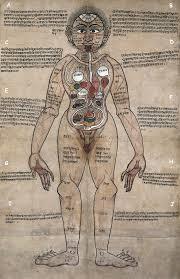The Origin of the Human Being in Ayurveda (From Sarngadhara’s 13th century Compendium)
Excerpted from Yoga Therapy, Chapter 2.
The source of the world is motiveless and has the unique appearance of consciousness and bliss. It has an eternal Nature [prakriti], like the shadow cast by the sun. Although herself inert, she used the consciousness of the supreme Self [purusha] to create all and everything which is transient, like a piece of theatre.
In the beginning, Nature, the mother of all, gave birth to intellect [mahat], composed of desire [rajas] and vast in appearance [sattva]. Out of that came personal identity [ahamkara]. It was born in three divisions [gunas], according to the qualities of purity [sattva], passion [rajas], and darkness [tamas]. From the unity of purity and passion arose the ten organs [indriyas] and also the mind [manas]. The organs are: the ear, the skin, the eye, the tongue, the nose, the voice, the hands, the feet, the sex organs, and the rectum. Those with detailed understanding say that the first five are the organs of intellect, while the remaining five are the organs of action.
From personal identity, dominated by qualities of passion and purity, arose the set of five subtle elements [tanmatras]. The wise recite the names of these subtle elements as follows: sound, touch, visible form, taste, and smell.
Sound, touch, visible form, taste, and smell, the characteristics of the respective subtle elements, arrived at a gross condition. From these subtle elements arose five gross elements [mahabhutas], which are considered to be space, wind, fire, water, and earth.
These five, sound and so forth, are thought of as the organs of intellect. Similarly, the characteristics of the organs of action are speaking, grasping, walking, orgasm, and excreting.
Nature is also known by the names “Principle,” “Power,” “Eternal,” and “Unaltered.” She is located in Shiva. The wise know that the following seven items are Nature and her modifications: intellect, personal identity, and each of the five elements. Having pervaded everything, they dwell in the world.” [Wujustyk 2003: 277-8]
